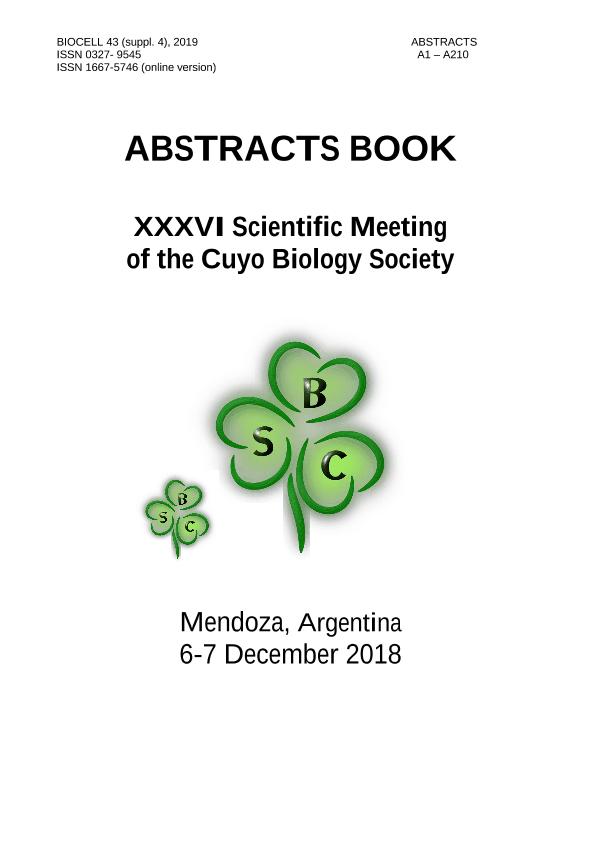Mostrar el registro sencillo del ítem
dc.contributor.author
Germano, Maria Jose

dc.date.available
2023-07-19T13:43:14Z
dc.date.issued
2020
dc.identifier.citation
Immune response to develop a vaccine against leishmaniasis; XXXVI Scientific Meeting of the Cuyo Biology Society; Mendoza; Argentina; 2018; 4-4
dc.identifier.issn
0327-9545
dc.identifier.uri
http://hdl.handle.net/11336/204449
dc.description.abstract
Leishmaniasis is an infectious disease caused by flagellated parasites belonging to Leishmania genus and transmitted by phlebotominae sandflies. Leishmaniasis is distributed in 98 countries of the world; in Argentina, the endemic areas are the Northwest and Northeast regions of the country.Leishmania parasites present two different stages: the intracellular amastigote localized in the mammalian polymorphonuclear cells and the extracellular promastigote, presents in the sanfly vector. This disease manifests different clinical forms: cutaneous, mucocutaneous or visceral leishmaniasis, mainly depending on the species of Leishmania involved.There is currently no vaccine against human leishmaniasis. In order to develop that, it is important to considerate the immunology of susceptibility and resistance to leishmaniasis, which depends on the genetic background of host and the specie, and even the specie of Leishmania involved. In consequence, it is possible that a vaccine is effective against one Leishmania specie but not against others.Our research group has been developing first generation vaccine, using Total L. amazonensis Antigens (TLA) which combined with Poly(I:C) and/or Montanide ISA 763 produce a Th1 like immune response and protect against L. amazonensis infection. Using serums of vaccinated mice, immunoproteomic assay was made in order to identify and select the immunodominant antigens, and therefore develop third generation vaccines.
dc.format
application/pdf
dc.language.iso
eng
dc.publisher
Tech Science Press

dc.rights
info:eu-repo/semantics/openAccess
dc.rights.uri
https://creativecommons.org/licenses/by/2.5/ar/
dc.subject
Leishmania
dc.subject
Vaccine
dc.subject
Immunology
dc.subject.classification
Bioquímica y Biología Molecular

dc.subject.classification
Ciencias Biológicas

dc.subject.classification
CIENCIAS NATURALES Y EXACTAS

dc.title
Immune response to develop a vaccine against leishmaniasis
dc.type
info:eu-repo/semantics/publishedVersion
dc.type
info:eu-repo/semantics/conferenceObject
dc.type
info:ar-repo/semantics/documento de conferencia
dc.date.updated
2023-02-16T10:53:40Z
dc.journal.volume
43
dc.journal.number
Suplemento 4
dc.journal.pagination
4-4
dc.journal.pais
Estados Unidos

dc.description.fil
Fil: Germano, Maria Jose. Consejo Nacional de Investigaciones Científicas y Técnicas. Centro Científico Tecnológico Conicet - Mendoza. Instituto de Medicina y Biología Experimental de Cuyo; Argentina
dc.relation.alternativeid
info:eu-repo/semantics/altIdentifier/url/https://www.techscience.com/biocell/v43nSuppl.4
dc.conicet.rol
Autor

dc.coverage
Nacional
dc.type.subtype
Reunión
dc.description.nombreEvento
XXXVI Scientific Meeting of the Cuyo Biology Society
dc.date.evento
2018-12-06
dc.description.ciudadEvento
Mendoza
dc.description.paisEvento
Argentina

dc.type.publicacion
Journal
dc.description.institucionOrganizadora
Sociedad de Biología de Cuyo
dc.source.revista
Biocell

dc.date.eventoHasta
2018-12-07
dc.type
Reunión
Archivos asociados
